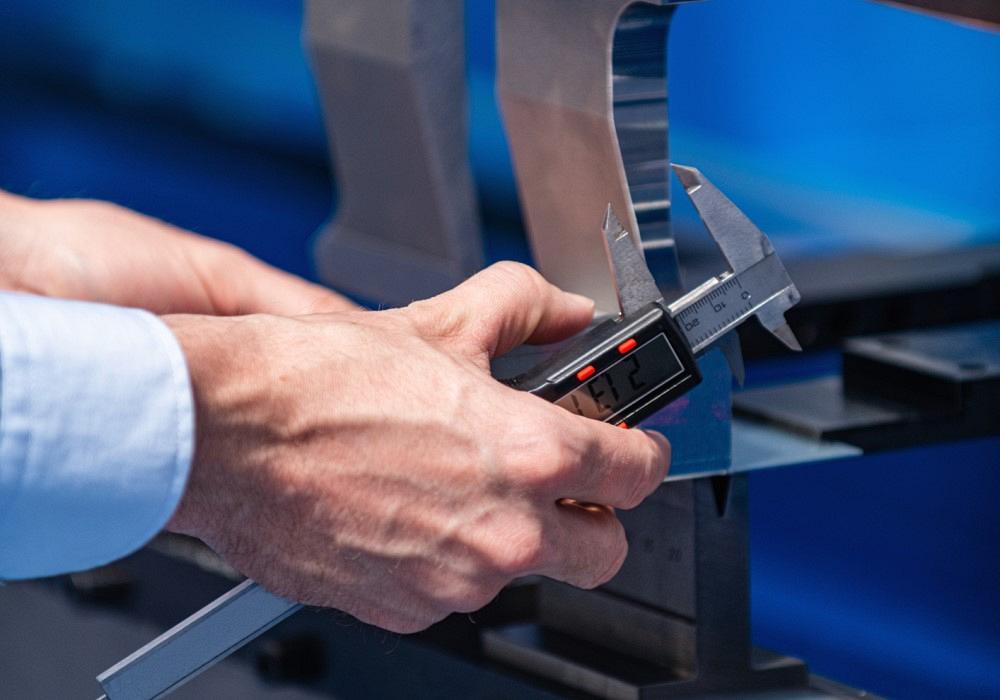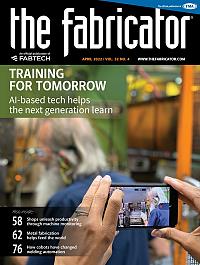- FMA
- The Fabricator
- FABTECH
- Canadian Metalworking
Categories
- Additive Manufacturing
- Aluminum Welding
- Arc Welding
- Assembly and Joining
- Automation and Robotics
- Bending and Forming
- Consumables
- Cutting and Weld Prep
- Electric Vehicles
- En Español
- Finishing
- Hydroforming
- Laser Cutting
- Laser Welding
- Machining
- Manufacturing Software
- Materials Handling
- Metals/Materials
- Oxyfuel Cutting
- Plasma Cutting
- Power Tools
- Punching and Other Holemaking
- Roll Forming
- Safety
- Sawing
- Shearing
- Shop Management
- Testing and Measuring
- Tube and Pipe Fabrication
- Tube and Pipe Production
- Waterjet Cutting
Industry Directory
Webcasts
Podcasts
FAB 40
Advertise
Subscribe
Account Login
Search
Finding pride in press brake work
Precision measurement tools provide a good start for bending metal
- By Steve Benson
- April 21, 2022
- Article
- Bending and Forming
One of the biggest challenges in precision metal manufacturing is finding and retaining skilled, experienced employees. It seems that experienced help is not available at any price. Those folks with the required skills are usually happy where they are; you’re not buying them away from their current employer without substantial cost to your company.
Fighting Boredom
You hire someone with potential. You invest in their training only to watch them walk out the door, taking that investment with them. Most employees who move on are not on their way to a competitor’s shop; they move on to find something new and stimulating to do. You become a steppingstone on the way to something else.
People move on for many reasons. Even so, many start looking around because they get bored with the whole process and see no future in it. Sure, it was interesting at first, but it became mundane and boring in short order. But why?
Technology improvements are inevitable. They compensate for the lack of skilled workers, driving the technological change even faster. We keep smarting-up the machines to fill in the gaps. So, by extension, we need fewer skilled workers, and a dumbed-down workforce is the result. We soon learn that this was not one of our better ideas, but it has become our reality, and again we find ourselves back to trying to smarten up the machines. The situation has become a self-feeding downward spiral.
Can We Stop the Downward Spiral?
Working in a metal fabricating shop is not for everyone. Some would like to do the job but have no business anywhere near a piece of equipment. Others might be well-suited for the trade but want nothing to do with it. Then you will have those special few who are capable, have the aptitude for the trade, and actually want to be involved. However, you will find that even these folks walk away in time—and these are the very people we need the most at all levels of the organization.
So, can we stop the downward spiral? The short answer is no, we can’t, but we can do many simple things that will help to keep those special few the industry needs instead of watching them walk away. The answer is to get them involved, and that starts on day one.
Consider the learning curve for the press brake, a machine that you will not learn overnight. What happens when you take any halfway intelligent person, well-educated or not, and stand them in front of the press brake for the first time? Some may be scared, but most will be awed at what they are seeing: the process of changing a flat piece of metal into a 3D object, something they could hold in their hand and say, “Wow, I built that!” That object they just built will become a source of pride.
But after a few short weeks, they realize the once-exciting future they had envisioned has been reduced to “Push that button, now step on that pedal 3,000 times. And don’t forget to check every 10th part.” At the same time, your once-future craftsperson is now saying to themselves, “I am outta here; this job sucks.”
They haven’t been in the trade long enough to comprehend the length of time involved in the press brake’s learning curve and just how much there is to learn. Those new hires no longer care that one day they could make some excellent pay if they stick with it and learn the skill. They are bored to tears and ready to move on. Our industry needs them to stay, so how do we do that?
Changing the Paradigm
Realistically, press brakes, along with manufacturing equipment in general, will keep improving. The millennials and those younger than them are still getting their trophies just for showing up, so common sense and good work ethics are, well, becoming a thing of the past. Finding anyone with the traits we need will get harder and harder to do.
There is not much chance that junior and senior high school shop classes will be making a comeback anytime soon. You will be starting with people who can’t read a tape measure correctly. That, of course, does not speak to aptitude or ability. It just means no one has ever taught them. This is where personal precision measurement tools can play a critical role. They can keep employees interested, motivated, and on the job.
How can these precision measurement tools help? That can be summed up in a single word: pride. They have pride in their tools and pride in what they can do with them. They have pride in their toolbox that’s personalized, complete with pictures of the wife, husband, girlfriend or boyfriend, the kids, or their cars. These all act as reminders of why they took the job in the first place!
Consider your new hires, your future craftspeople, on their first day as press brake technicians and operators. They still will not have any idea of what will be required or how long it will take to learn this new machine—though they probably have heard several estimates, most of which will leave them even more confused. Nonetheless, they have shown a genuine interest in metal forming, and they have the aptitude for the job. You hope they will work out and stay for the long term.
Two Scenarios
The scenarios that follow occur in a prototype and short-run job shop environment. However, the concepts could apply to OEMs as well.
Plant Manager: This is the tool bin. You come here and check out your calipers and a square along with any other tool you need before beginning your shift. We will train you how to do setups eventually, but for the time being, your department lead will be taking care of that for you.
New Hire: Umm, OK. [Thinking “I guess” and shaking his head.]
Plant Manager: He’s all yours, lead. [He turns and walks off.]
Press Brake Lead: OK, so here’s the plan. Push this start button on the press brake controller and set your part against the stops. [The lead points at the part, then continues.] Remember that this is the first bend; it bends up. Then when you are ready, step on the pedal. It is that simple. [Then, while pointing at a machine drawing located on the ram of the press brake, the lead continues.] Check these circled dimensions every 10 parts and write your findings here. [He points at the statistical process control (SPC) chart.] I'll be back in a while to see how you are making out. [As the lead walks away, he pauses briefly and looks back.] Oh yeah, remember to keep your head, hands, and fingers away from the pinch point.
Inspiring, right? Guess again. Now compare that with the next scenario.
Plant Manager: I see that you have the tools that we recommended and a box to keep them in. Excellent. Did you review the documentation on how to care for, use, and calibrate your new tools?
New Hire: Yes, sir, I have! I never realized how delicate an instrument a caliper was or how often it needed to be checked. It has been a learning experience, for sure.
Plant Manager: I see that you did well on the pre-employment math and blueprint interpretation, also excellent. That being said, I will pass you over to your area lead who will be teaching you the rest. Remember, there is a lot to learn about press brakes, and it will take time. But in the end, if you stick with it, you’ll have a great career that is both interesting and challenging.
New Hire: Thank you, sir. I’m looking forward to it!
Press Brake Lead: All right then, this is the press brake you will be learning on. While all press brakes are the same in many ways, each is unique. I want you first to sit down, take as much time as you need, and study the manual for this press brake, especially the safety aspects. When you’re comfortable with that, use the radio to call me, and we’ll get you started on your first parts.
Just so you know, we’ll be starting you off with some simple setups and parts, but don’t worry; it won’t be slow, simple, or boring for very long. Just realize that becoming a craftsman will take a while.
You’re off to a great start with a great company; you’ve invested in yourself with a toolbox and your basic precision measurement tools. They’re yours, so we know that you will care for them. Also, you’ll need to know how to check them against standards for calibration and how to measure parts correctly. It’s a great place to start.
You’ll do just fine! Now go sit down and study that manual. Call for help when you need some. It’s how we all learned the trade.
A Review of Scenario One
Assuming that a pair of calipers was checked out, was the operator given any instructions on caring for or using it? Nope. How about the square? Nope.
Did they inform the new hire how often to check the part? Yes, but not how often to check the calipers for accuracy. Was the new hire offered an instruction sheet on using and caring for the calipers? Certainly not.
For that matter, was the new hire offered the press brake operator’s manual to review? Nope! I guess operator safety is not an issue for them.
They hired this new employee because they thought the person had aptitude and drive to make it in the trade. That’s someone they would want to inspire, but do you think they accomplished that? Of course they didn’t. Doing this with all new hires will leave a bad taste in their mouths about the trade from day one.
A Review of Scenario Two
Imagine if this second scenario resembled the experience of all new hires at your shop. Considering the machines and the leadership management showed, do you think new hires are inspired? Yeah, you bet they are. You’ve shown that you have faith in them. You had them invest in themselves with the pride of ownership in their tools.
Odds are that the investment you are about to make in them will pay off. Why? Because you have shown an interest in them and their future, you care about their safety, and you don’t just say, “Push this button and step on this pedal 300 times.”
About Leadership
It takes a particular aptitude and skill set to run a brake. Bore new operators from the first day and (trust me here) they will be leaving your employ in short order. Show them just how much there is to know and learn and what the pride of craftsmanship can do for them, and there is no doubt that they will be staying on and continuing to learn.
New operators have a lifetime’s worth of knowledge to absorb. Best of all, they will be producing your products with pride and craftsmanship. It’s not just about the hand tools, of course, though that is a great place to start. It’s about leadership and how you use it.
About the Author

Steve Benson
2952 Doaks Ferry Road N.W.
Salem, OR 97301-4468
503-399-7514
Related Companies
subscribe now

The Fabricator is North America's leading magazine for the metal forming and fabricating industry. The magazine delivers the news, technical articles, and case histories that enable fabricators to do their jobs more efficiently. The Fabricator has served the industry since 1970.
start your free subscription- Stay connected from anywhere

Easily access valuable industry resources now with full access to the digital edition of The Fabricator.

Easily access valuable industry resources now with full access to the digital edition of The Welder.

Easily access valuable industry resources now with full access to the digital edition of The Tube and Pipe Journal.
- Podcasting
- Podcast:
- The Fabricator Podcast
- Published:
- 04/16/2024
- Running Time:
- 63:29
In this episode of The Fabricator Podcast, Caleb Chamberlain, co-founder and CEO of OSH Cut, discusses his company’s...
- Trending Articles
Tips for creating sheet metal tubes with perforations

Are two heads better than one in fiber laser cutting?

Supporting the metal fabricating industry through FMA

JM Steel triples capacity for solar energy projects at Pennsylvania facility

Omco Solar opens second Alabama manufacturing facility

- Industry Events
16th Annual Safety Conference
- April 30 - May 1, 2024
- Elgin,
Pipe and Tube Conference
- May 21 - 22, 2024
- Omaha, NE
World-Class Roll Forming Workshop
- June 5 - 6, 2024
- Louisville, KY
Advanced Laser Application Workshop
- June 25 - 27, 2024
- Novi, MI



























